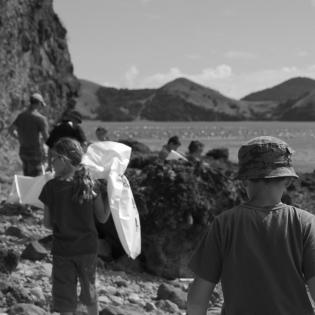Garbage Collection
Children participate in a trash clean-up and analyze the issue of pollution caused by trash, especially plastics. They discuss who should be responsible for preventing or cleaning up pollution - government, business, charitable organizations, and/or individuals.
The learner will:
- participate in a trash collection.
- measure, graph and analyze the collected trash.
- discuss the responsibility to prevent pollution from trash and to address the issue of trash.
- Trash containers
- Plastic gloves
- paper and pencil for recording
pollution: contamination of the natural environment with harmful substances as a consequence of human activity
Instructions
Anticipatory Set
Walk around the neighborhood or an area where trash accumulates with a trash bag and gloves, as well as paper and pencil for recording the trash found. For safety, do not pick up sharp or potentially contaminated items, but record them on paper.
Back from the trash pickup, measure the trash collected by volume or weight, or they may count the number of items collected and recorded.
They create a graph to track collection data. The trash can be categorized and graphed such as plastic, papers, compostable, and metal.
Recycle as many of the items collected as possible. Make sure they dispose of the gloves safely and wash their hands. As an alternative, discuss the types of litter they have observed in parks and on the street.
Discuss:
- How did this garbage end up on the ground? (People may be careless or it may have blown out of the garbage cans)
- What types of trash were most common - plastic, paper, metal, organic materials? (This can be an estimate or actual counting/graphing of collected trash.)
- Who should be responsible for preventing or cleaning up trash? What role can and should the government, businesses, and/or charitable organizations (such as a local service organization that adopts a section of highway to keep clean) play in preventing or cleaning up pollution from trash?
- How do you think we as individuals can reduce trash pollution in our community?
They will be learning next about one large source of pollution in the world that they can do something about - plastic bags.
Philanthropy Framework
-
Strand PHIL.I Definitions of Philanthropy
-
Standard DP 02. Roles of Government, Business, and Philanthropy
-
Benchmark E.1 Give examples of needs met by government, business, civil society, and family.
-
-
-
Strand PHIL.IV Volunteering and Service
-
Standard VS 03. Providing Service
-
Benchmark E.1 Provide a needed service.
-
-
